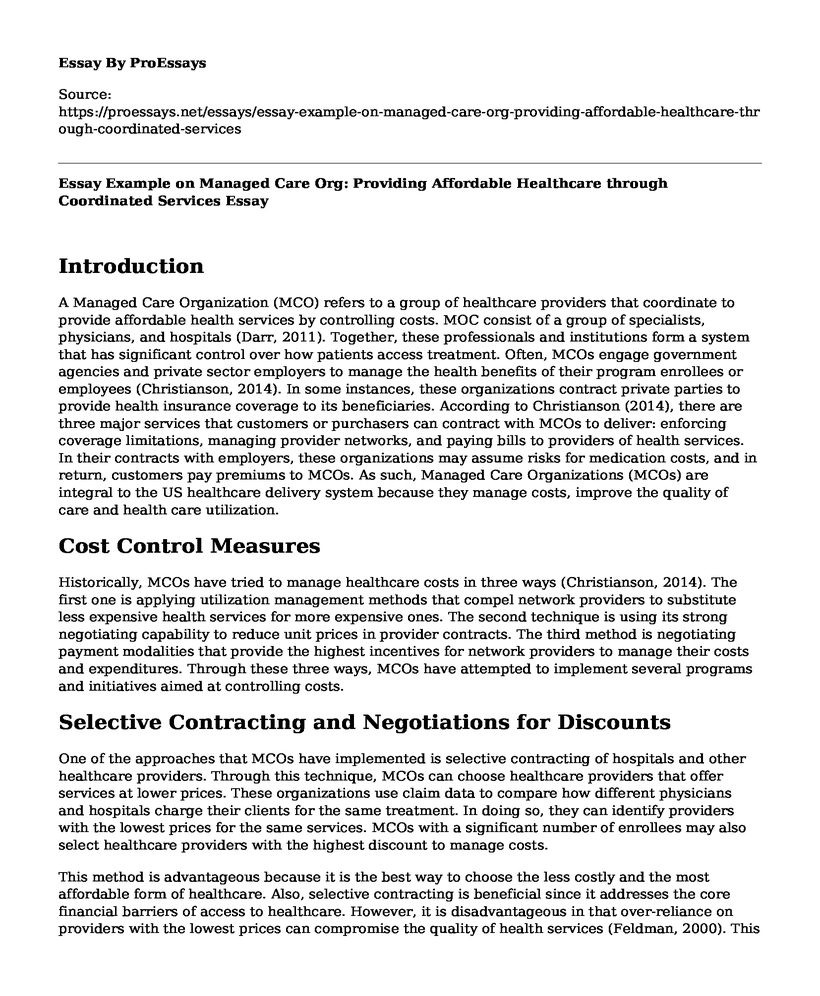Introduction
A Managed Care Organization (MCO) refers to a group of healthcare providers that coordinate to provide affordable health services by controlling costs. MOC consist of a group of specialists, physicians, and hospitals (Darr, 2011). Together, these professionals and institutions form a system that has significant control over how patients access treatment. Often, MCOs engage government agencies and private sector employers to manage the health benefits of their program enrollees or employees (Christianson, 2014). In some instances, these organizations contract private parties to provide health insurance coverage to its beneficiaries. According to Christianson (2014), there are three major services that customers or purchasers can contract with MCOs to deliver: enforcing coverage limitations, managing provider networks, and paying bills to providers of health services. In their contracts with employers, these organizations may assume risks for medication costs, and in return, customers pay premiums to MCOs. As such, Managed Care Organizations (MCOs) are integral to the US healthcare delivery system because they manage costs, improve the quality of care and health care utilization.
Cost Control Measures
Historically, MCOs have tried to manage healthcare costs in three ways (Christianson, 2014). The first one is applying utilization management methods that compel network providers to substitute less expensive health services for more expensive ones. The second technique is using its strong negotiating capability to reduce unit prices in provider contracts. The third method is negotiating payment modalities that provide the highest incentives for network providers to manage their costs and expenditures. Through these three ways, MCOs have attempted to implement several programs and initiatives aimed at controlling costs.
Selective Contracting and Negotiations for Discounts
One of the approaches that MCOs have implemented is selective contracting of hospitals and other healthcare providers. Through this technique, MCOs can choose healthcare providers that offer services at lower prices. These organizations use claim data to compare how different physicians and hospitals charge their clients for the same treatment. In doing so, they can identify providers with the lowest prices for the same services. MCOs with a significant number of enrollees may also select healthcare providers with the highest discount to manage costs.
This method is advantageous because it is the best way to choose the less costly and the most affordable form of healthcare. Also, selective contracting is beneficial since it addresses the core financial barriers of access to healthcare. However, it is disadvantageous in that over-reliance on providers with the lowest prices can compromise the quality of health services (Feldman, 2000). This aspect can potentially lower consumer satisfaction and MCO’s reputation.
Utilization Management
MCOs have attempted to implement utilization review techniques as part of its cost-containment strategies. Under this method, MCOs request for the evaluation of doctors' treatment decisions to identify areas that can help reduce costs without compromising health outcomes (Bailit & Sennett, 2008). On behalf of the purchaser, MCOs may also do a case-by-case evaluation of the appropriateness of care. A study by Bailit and Sennett (2008) showed that about 73% of employers support utilization review or the assessment of physicians’ treatment decisions as a technique to control costs. The rationale and benefit of utilization management are based on the idea that there are several inefficient and unnecessary services offered to patients (Bailit & Sennett, 2008). Utilization management is also beneficial because it can save a substantial amount of money by controlling unnecessary care. However, this cost control technique is disadvantageous in that it threatens the autonomy and the independence of physicians administering medication. This aspect, in turn, can interfere with treatment plans.
Conclusion
Managed care is essential in the era of increasing healthcare costs. This aspect is an alternative to the provision of care services on a fee-for-service basis. As such, MCOs are vital since their efforts have the potential to enhance the quality of care and reduce healthcare spending. In the past, MCOS has tried to control costs by reducing the price paid to providers, negotiating for low prices, and selecting providers that charge the lowest fees. While these techniques can help manage costs, it is necessary to consider their impacts on the quality of care.
References
Bailit, H. L., & Sennett, C. (2008). Utilization management as a cost-containment strategy. Health care financing review, 87(1). https://www.ncbi.nlm.nih.gov/pmc/articles/pmc4195135/
Christianson, J. B. (2014). Managed care organizations: A 'nexus of contracts.' Health Economics, 187-194. https://doi.org/10.1016/B978-0-12-375678-7.00909-3
Darr, K. (2011). Ethics in health services management (5th Ed.). Health Professions Press.
Feldman, R. (2000). The ability of managed care to control health care costs: how much is enough? Journal of health care finance, 26(3), 15-25. https://www.researchgate.net/publication/12586565
Cite this page
Essay Example on Managed Care Org: Providing Affordable Healthcare through Coordinated Services. (2023, Aug 31). Retrieved from https://proessays.net/essays/essay-example-on-managed-care-org-providing-affordable-healthcare-through-coordinated-services
If you are the original author of this essay and no longer wish to have it published on the ProEssays website, please click below to request its removal:
- Analytical Essay on Starbucks
- Essay on Type 1 & 2 Diabetes: Causes, Symptoms & Complications
- Essay Example on Dell & HP Merge: Quality, Culture, and Cost Benefits
- Essay Example on Abortion Debate: Right or Wrong?
- Dementia: Symptoms & Challenges in Home-Based Care - Essay Sample
- Supervision: A Professional Role Beyond Management - Essay Sample
- Essay Example on Organizational Culture: A Key Factor in Success and Fraud







